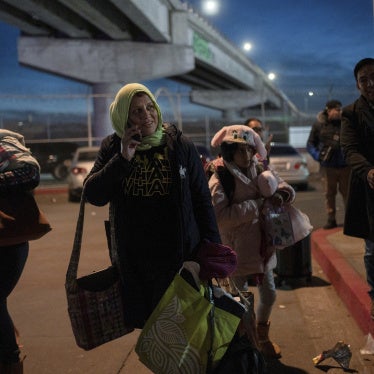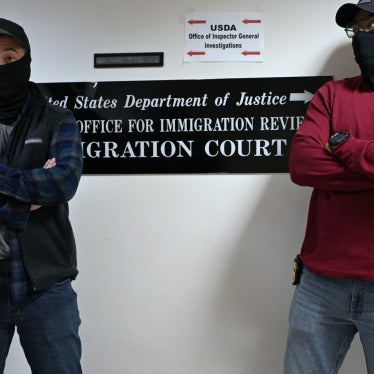John Morton
Director
Immigration and Customs Enforcement
500 12th Street SW
Washington, DC 20536
Dear Director Morton:
Thank you for allowing us the opportunity to submit comments on the draft policy regarding resumed removals to Haiti. Human Rights Watch is an independent organization dedicated to promoting and protecting human rights in some 90 countries around the globe. In the United States, we work to secure increased recognition of and respect for internationally recognized human rights, focusing on issues arising from discrimination, detention, and insufficient access to the courts.
A devastating earthquake near Haiti's capital, Port-au-Prince, on January 12, 2010, left an estimated 222,750 people dead, 300,000 injured, and up to 1.6 million homeless and displaced. A year after the earthquake approximately 810,000 people still live in some 1,150 informal settlements or camps, where conditions leave residents vulnerable to flooding, disease, and violence. The situation after the earthquake has exacerbated Haiti's chronic human rights problems, including violence against women and girls, inhumane prison conditions, and vulnerability of children. Already weak, the diminished capacity of the state since the disaster continues to significantly undermine its ability to safeguard fundamental human rights.
As indicated by the US government's blanket moratorium on removals, many of the risks to Haitians' health and safety were - and we believe continue to be - generalized threats irrespective of the individual's status or background. A person with a criminal background, no less than another person, faces the risk of contagious disease, lack of social services infrastructure, homelessness, joblessness, etc. And in some respects, for example the near-universal practice of detaining criminal deportees upon return, they are more likely to be exposed to inhuman and degrading conditions that pose serious risks to health and safety. We question whether conditions on the ground in Haiti are currently such that removals can be resumed for any Haitians that are both "safe" and "humane" (two words used in the draft policy).
In the face of the gravity of the current situation in Haiti, the draft policy presented for comment on Monday is insufficient. It (1) fails to provide a justification for the change in policy based on conditions in Haiti; (2) offers a confusing definition of the universe of people impacted by the policy; and (3) lacks provisions that would ensure due process. We believe that this policy should be more fully developed prior to being formally adopted.
First, the draft policy does not start with a finding that the situation on the ground in Haiti has sufficiently improved to justify renewing returns for anyone. Since the original policy was established as a direct response to conditions arising from a disaster, the change in policy needs to begin with an assessment of those conditions and a justification for the need or rationale for a new policy.
Second, the draft policy does not clearly define the category of people who will be returned, but rather presents an internally contradictory definition of the universe of people covered. The first paragraph identifies people covered by the policy as "criminal aliens with a focus on serious offenders such as violent felons." In the second paragraph, the universe is defined differently, as "individuals convicted of a range of serious crimes" including "sale of marijuana" and "larceny." Shoplifting or the sale of a small amount of marijuana is a misdemeanor in many states, and not a crime of violence. On the face of the policy, it is unclear to us whether ICE is truly prioritizing "violent felons" or is planning to deport any Haitian national who committed a non-violent misdemeanor many years ago.
We request that the policy define the target population more clearly and more narrowly. ICE should not be dedicating limited resources, nor rushing any policy decisions, related to the deportation of non-violent offenders to unsafe conditions. The policy should also be clear that it does not permit the detention of non-violent offenders beyond 90 days.
Third, any final removal policy must specifically address transfers of detainees and ICE's commitment to respect their due process. We understand that many Haitians have been picked up by ICE as it initiated its plan to resume removals (and prior to release of this draft policy). These people have been immediately transferred to Louisiana. The draft policy before us does not specify where Notices to Appear will be filed for immigrants impacted by this policy. It does not discuss whether transfers are effectuated even if the immigrant is represented by counsel.
Finally, we regret that we were given such little time to comment on a policy with such grave consequences. We are even more concerned that the policy was presented to us for comment after deportations to Haiti had already resumed. The cart is before the horse here. We therefore strongly recommend that there should not be any further deportations to Haiti until ICE fully examines and responds to all the comments to this draft policy. Thank you for your attention and consideration of our views.
Sincerely,
Antonio M. Ginatta
Advocacy Director, US Program
Human Rights Watch








